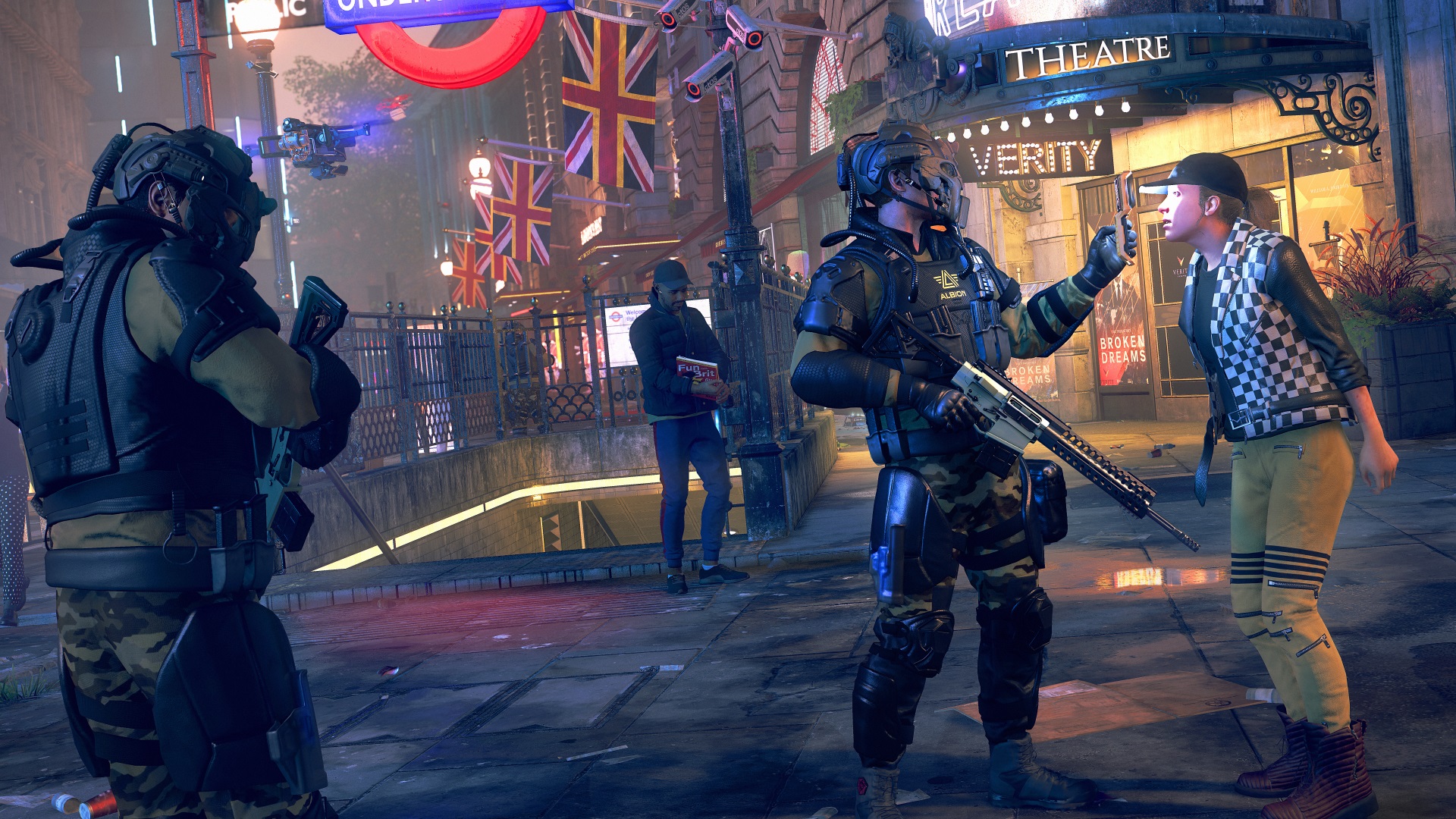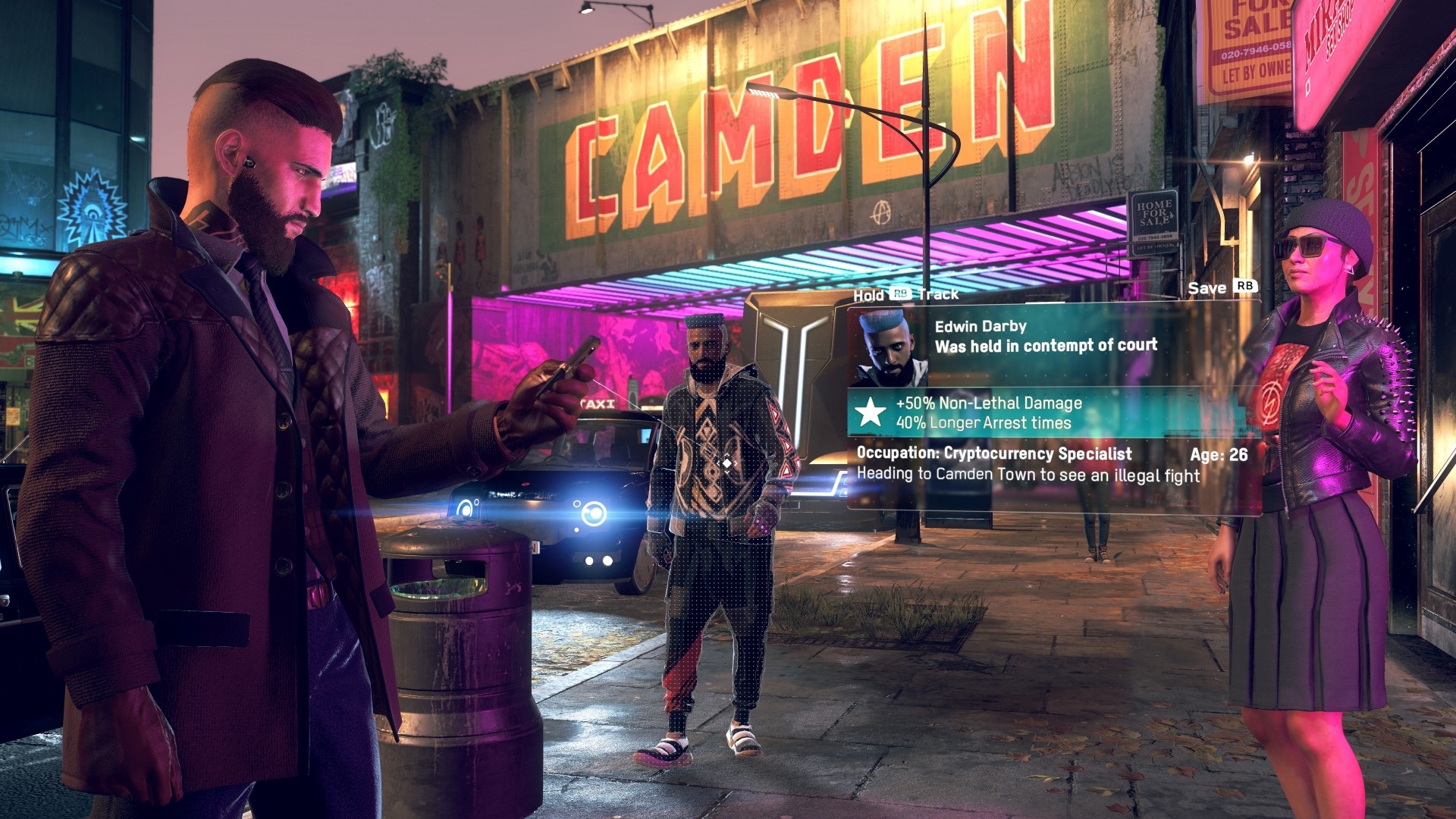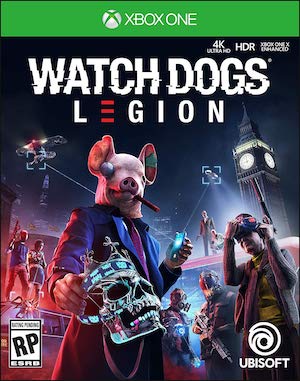
Watch Dogs as a franchise didn’t start out as well as it should have, with the first game in the series disappointing many, but the sequel was a major course-corrector. With the upcoming Watch Dogs Legion, the series is being taken in a new direction, one that looks like it’ll be making good on many of the promises that the first game made. It’s “play-as-anyone” mechanic has piqued the interest of many, ourselves included, and we’re all more than just a little curious to see what implications it will have on everything from the narrative to character progression to open world gameplay. Recently, we got the chance to sit down for an interview with the game’s creative director, Clint Hocking, and speak about all those things and more. Read our conversation below.
"We definitely want players to be able to build any team they want and confront the challenges of the game however they choose to play."
How (and why) did you come up with the central premise of having every NPC be a playable character?
The Play As Anyone innovation emerged fairly naturally when we first started to look at the pillars of the Watch Dogs franchise, and at the evolution of the series. One of the original promises of the brand was the ability for the player to hack into the lives of any character they see in the world, and learn more about them using the Profiler.
For Watch Dogs Legion, we wanted to take the promise of the Profiler further by making everyone in the world live fully simulated lives. At the same time, we also looked at how DedSec evolved over time; from a group working in the shadows with Aiden in the original game, to a collective of hackers in the sequel. We asked ourselves if being able to build your own DedSec made sense, and once that idea lined up with a fully simulated population, the idea that any character could be your next playable hero made complete sense.
You’ve mentioned that every NPC will have their own voice dialogue, their own personalities and backstories, and that cutscenes will also change based on that, which is seriously impressive. I guess we have to drop the N in NPCs now. But given all the permutations and combinations, there are many who’re wondering how Watch Dogs Legion will achieve that. I’m no developer, obviously, but does the game make use of procedural generation techniques, where it pulls from pools of data on all the things a character requires, and then mixes and matches them for each new character- or something along those lines?
Characters in the world are generated on demand using a relational database that tracks everything from age, citizenship, gender identity, education and employment, hobbies, interests, family, etc. When you see a character in the world, they are ‘spawned’ the same way they would be in any other open world game – and at this point we only know a couple things about them: how they are dressed, what they look like, perhaps their job, etc. Once you Profile someone, we fill in the rest of their life on demand; if the person is a woman and you find her at a hospital wearing a long white medical jacket for example, we know she is a doctor and that she works between certain hours, and perhaps we know something about her personality from her animation set.
From the Profiler we can determine her salary and required education, as well as some things about her backstory. Going deeper, we can determine from her age, ethnicity and salary what neighborhoods she is mostly likely to live in. Then we can give her a home, friends, and a family. From there we can determine other things about her, like her hobbies and interests. This all allows us to build a schedule for her, and lock down her trait, and the problems she will have in her life that will allow you to recruit her. On top of this massive procedural system is also an enormous amount of content. Once we have determined the individual’s age, gender identity, and social background, we are able to assign them a narrative persona: a voice and personality that determines what script this character will use for all dialogue and scenes, so that she will have her own unique version of the story as you move through the game.
Theoretically, having every NPC playable means that the game should have nearly infinite replay value, because each NPC would encourage a different play style based on what they’re good (and bad) at. Is that something that Watch Dogs Legion takes into account for, say, its main missions? For instance, is every mission designed in such a manner so as to permit players to tackle it through stealth, out and out combat, a focus on hacking, or whatever the NPC they’re playing as specializes in?
All of the main missions and locations in the game have been designed with a primary class focus in mind in order to provide interesting variety. For example, we have layouts that are designed more for a stealth and melee focus, and others that are designed more for a hacking focus. With that in mind, however, it was absolutely our goal to ensure that every mission and location is interesting and fun regardless of which class you choose to engage with. In many cases, the most interesting challenges come when you are trying to play ‘against the grain’; using a hacker to engage in a very combat focused location, for example. This invites the player to play creatively and use their tools and the environment in surprising and unexpected ways; like when a hacker uses the Spiderbot turret mode, and explosive traps to overcome a difficult combat challenge. We definitely want players to be able to build any team they want and confront the challenges of the game however they choose to play.
"We like to think of the game as being an ‘ensemble game’, in the same vein as we think of ‘ensemble films’. Every character has their own personality and their own role, but the overarching story is the collective story of the team."
The concept of permadeath is also a very interesting one here- but effectively, how does it impact the game? Say I’ve made a ton of story progress with a character, and that character dies- how does that effect the story?
Permadeath is always an opt-in gamble for the player. When your health goes to ‘zero’ you enter the critically injured state. At this point you are always offered the opportunity to Surrender, and be sent to jail. You can systemically free Operatives who have been sent to jail, or wait for them to be released. But if you choose not to Surrender, and Keep Fighting, then you are risking Permadeath. Since every mission, every line of dialogue, and every cutscene has been written to account for every possible character, the loss of one of your characters means that the rest of your team will have to pick up where they left off and the plot and the story will carry on. Each character has their own origin story – the story of how they are recruited into DedSec, and once they are on your team, the main missions and the overall game narrative are the story of DedSec as a team, and how they collectively work to halt the emergence of the authoritarian regime that is trying to take over the city.
Will each character also be upgradable, to make that permadeath moment players have invested more time in even more of a gut punch?
Absolutely. Every character is trained in one of the three Classes as soon as they join DedSec, and every character has their own progression. They level up and gain perks and abilities over time. Your investment in your individual characters is very much about playing with them, seeing them move through the story of the game, and levelling them up over time. At the same time, DedSec has its own progression, and all of your characters also get more powerful as DedSec is upgraded, so losing an individual Operative is more about losing a character and access to their specific playstyle, as opposed to losing progression and finding yourself underpowered against the enemy.
Structurally, how does Watch Dogs Legion position itself, let’s say in its early hours, when there is no real main protagonist to play as or latch on to?
We like to think of the game as being an ‘ensemble game’, in the same vein as we think of ‘ensemble films’. Every character has their own personality and their own role, but the overarching story is the collective story of the team. Each player will have their own personal favorite characters and their own ‘stars’, but in the end, the mission to fight back against the authoritarians is the driving force of the story and the plot.
Having every NPC be completely playable is a very ambitious and exciting prospect, but from a narrative perspective, it presents the risk of having a story where you don’t really have a tentpole character to latch on to. How does Watch Dogs Legion counter that risk?
We think of the game as being an ensemble, and there are many examples of how these kinds of narrative structures work in other media. The player decides which characters are the most interesting and they choose to make these characters the hero of their game and the star of their own story. And seeing the heroes you have chosen, recruited, and invested in starring in the climactic cutscenes in the major questlines is a very unique and empowering experience.
Legion’s London also looks a lot more futuristic than Watch Dogs has looked before. Chronologically, how far into the future is this? How much of a gap are we looking at between this and Watch Dogs 2, in terms of years?
We are not specific about the exact year in which the game is set, rather allowing the player to interpret the timing for themselves. In creating speculative fiction we look at many different social, political and technological trends and extrapolate them all forward into a fictional future where they all converge in an extreme state. As such, some of the things we’re depicting – such as the ubiquity of drones in the world, or the presence of autonomous vehicles – might feel more near future. Conversely, some other things we’re depicting – such as the sophistication of AI – might feel decades away. The purpose was not to make predictions about some future year, but to create a world that is able to bring insightful perspective and commentary on a range of trends we see emerging in the world today.
"We invested a lot of time researching the British response and reaction to authoritarians, mismanaged government, and adversity in general. Among the many things that stood out was the British willingness to lampoon those who are abusing their power or authority. "
The dystopian London setting and the authoritarian order we’re going up against in Legion definitely give it a very Orwellian vibe, but there was plenty of humour in what we saw of the game. How does the game balance those two aspects?
We invested a lot of time researching the British response and reaction to authoritarians, mismanaged government, and adversity in general. Among the many things that stood out was the British willingness to lampoon those who are abusing their power or authority. Whether that’s expressed as a funny walk, a ridiculous imitation of an accent, an outlandish fashion statement, a pig mask, or even just a cleverly written protest sign – Brits are known for bringing a clever and sometimes absurdist touch to their criticism. This was something we wanted to capture in the game; the British capacity to maintain their cultural values in the face of extreme adversity.
From a story perspective, is this a direct sequel to Watch Dogs 2?
There are definite parts of the game that are nods to previous Watch Dogs games, and both Tidis and Blume have important roles in different parts of the main questlines. We feel Watch Dogs Legion, despite its transformative innovations, is a true successor to the previous games that builds on the strong legacy of the brand.
Is there a hard limit on how many NPCs we can take control of?
You can have a maximum of twenty operatives in your DedSec team at any given time, though the number of characters you could potentially play as is unbounded.

















